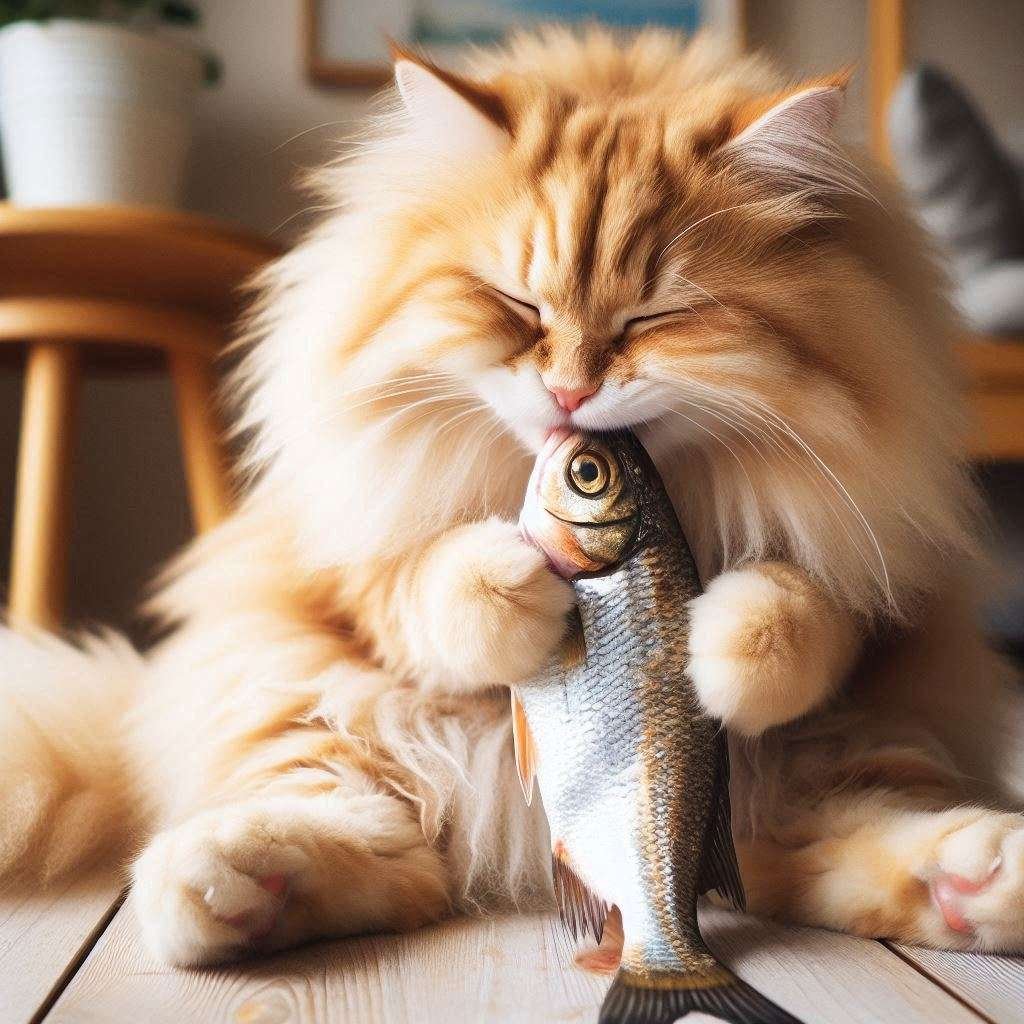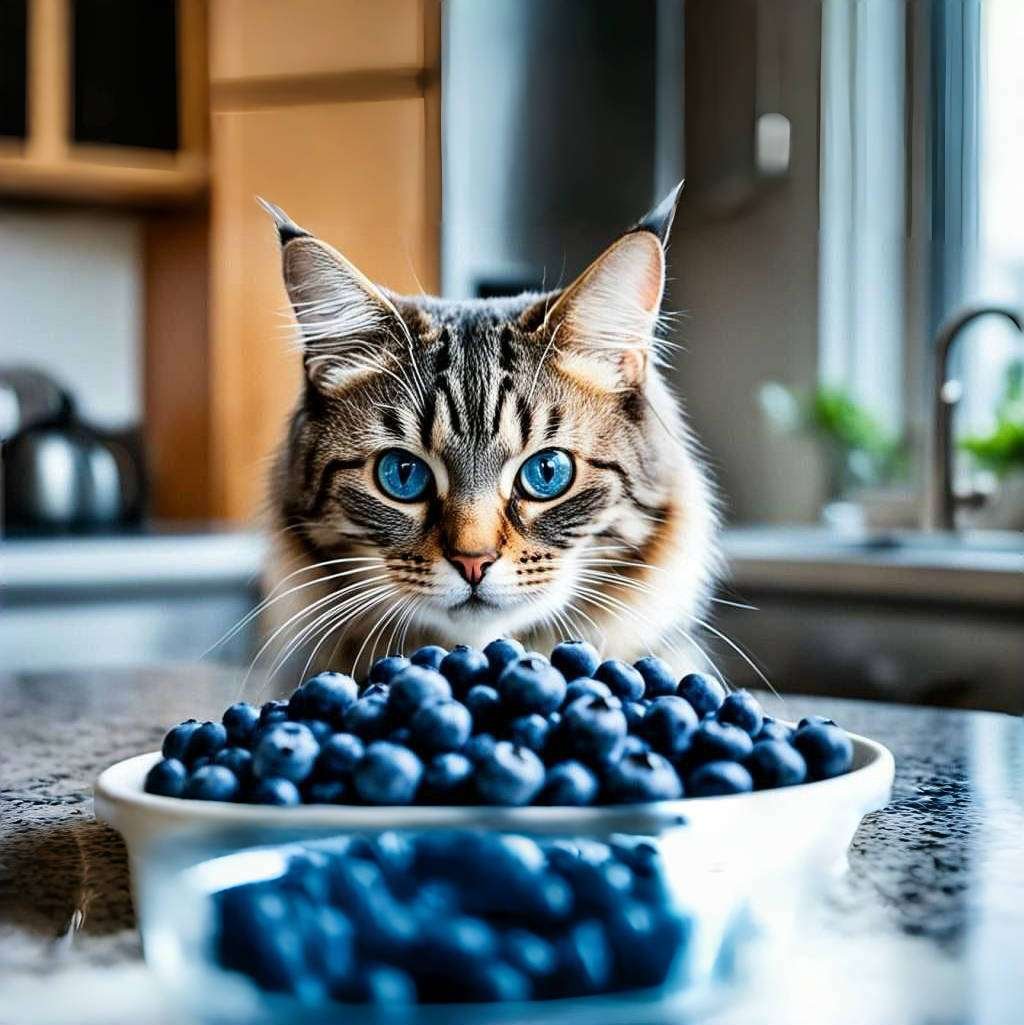What is Taurine for cats? Taurine is a key amino acid vital for cats’ health and well-being. It’s found only in animal proteins, making it crucial for their vision, digestion, heart function, immune system, pregnancy, and fetal growth. Cats can’t make taurine on their own, so it’s a must-have in their diet.
Getting enough taurine is very important for cats. Not having enough can cause big health problems. Issues like feline taurine retinopathy, dilated cardiomyopathy, and digestive problems can happen. Pregnant cats with low taurine may have smaller litters, tiny kittens, or birth defects.
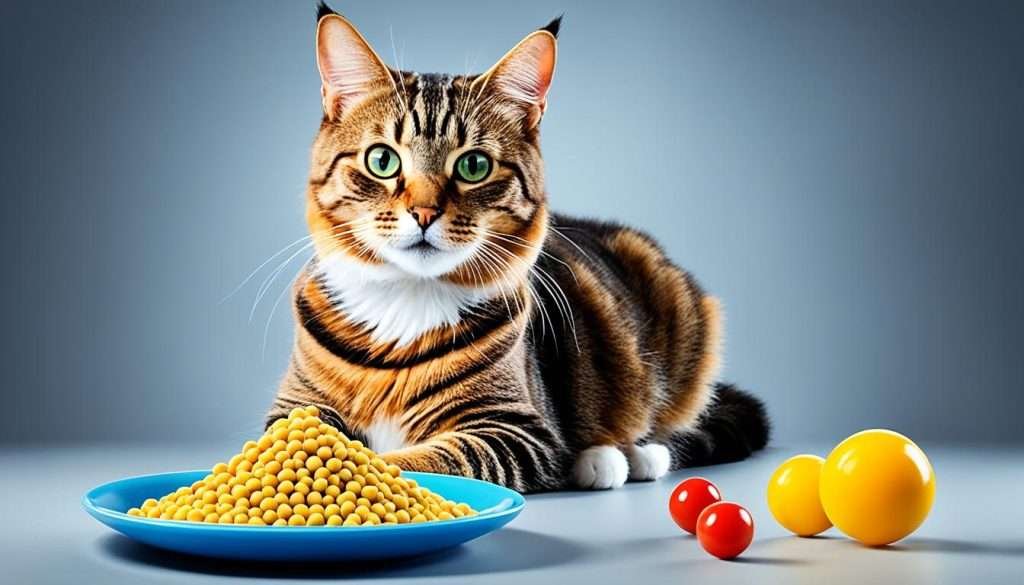
Key Takeaways
- Taurine is an essential amino acid for cats, crucial for vision, heart, digestive, and reproductive health.
- Cats have a limited ability to produce taurine, making it a necessary component of their diet.
- Taurine deficiency can lead to serious health issues like blindness, heart disease, and reproductive problems.
- Commercial cat foods are formulated to provide adequate taurine, but homemade diets may lack this essential nutrient.
- Taurine supplementation can be used to treat specific health conditions in cats, such as dilated cardiomyopathy.
What is Taurine and Why is it Important for Cats?
Taurine is a special amino acid vital for cats. Cats can’t make taurine on their own and need it from food. It’s a key part of their health, making up 0.1% of their body weight.
Taurine is crucial for many health aspects, like digestion, vision, heart health, and bones.
Taurine’s Role in Feline Health
Taurine is a must-have amino acid for cats. It lowers the risk of heart disease and boosts brain health. It also helps with eye health and can prevent serious vision issues. Plus, it supports the immune system with its antioxidant properties.
Essential Amino Acids for Cats
Amino acids build proteins, and cats need some they can’t make themselves. Taurine is one of these essential amino acids. Cats have unique amino acid needs, and taurine is key among them.
Cats need 35 mg to 250 mg of taurine daily, which is about 0.2% of their diet. Cheaper foods might add taurine, while high-quality foods use meat for it.
Fish like whitefish, cod, and tuna are great taurine sources for cats. Chicken is also rich in taurine and is nutritious. Beef is another good option, found in quality cat foods or as treats.
The Importance of Taurine for Cats
Taurine is a key nutrient for cats because they can’t make it from other amino acids. Unlike humans and dogs, cats can’t create taurine on their own. This amino acid is vital for their health, supporting their vision, heart, digestion, immune system, and growth.
Not getting enough taurine can cause big health problems in cats. A lack of taurine can lead to heart disease, making it hard for the heart to work right and even causing heart failure. Cats might also lose their sight because of damaged retinal cells. Taurine also helps with dental health, reproduction, growth, and digestion, so not having enough can cause problems in these areas too.
Taurine is very important for cats. Since 1987, taurine has been added to cat food, making it less common for cats to lack it. Cats with heart disease often need to take medicine for life. Adding taurine to their diet can help cats with these issues feel better in just a few weeks.
In short, taurine is crucial for cats, and not having it can cause many health issues. Making sure your cat eats enough taurine is key to keeping them healthy and avoiding serious diseases.
| Condition | Impact of Taurine Deficiency |
|---|---|
| Heart Health | Dilated cardiomyopathy, affecting heart function and causing heart failure |
| Vision | Degeneration of retinal cells, leading to blindness |
| Dental Health | Increased risk of tooth decay |
| Reproduction | Reproductive issues, potentially leading to infertility |
| Growth and Development | Developmental problems, including growth issues and bone fractures |
| Digestion | Gastrointestinal problems such as diarrhea and digestion issues |
| Coat Health | Hair loss |
| Immune System | Weakened immune responses |
| Metabolism | Increased risk of diabetes |
| Energy Levels | Lethargy and fatigue |
Taurine is key for cats’ health and well-being. Making sure your cat gets enough taurine in their food is important for their health and happiness.
“Taurine is a vital nutrient for cats, and its absence can lead to a range of serious health problems. Providing your cat with a diet rich in taurine is crucial for their long-term well-being.”
In conclusion, taurine is very important for cats. Knowing how important it is and making sure your cat eats enough taurine can help them stay healthy and avoid serious problems.
Consequences of Taurine Deficiency in Cats
Not having enough taurine in a cat’s diet can cause serious health problems. One major issue is feline central retinal degeneration (FCRD). This happens when the cells in the cat’s eyes break down, leading to vision loss. If not treated early, this condition can’t be fixed.
Feline Central Retinal Degeneration (FCRD)
Taurine deficiency also links to heart disease in cats, like dilated cardiomyopathy (DCM). DCM makes the heart chambers get bigger and the muscle weaker. This can lead to heart failure. If caught early, taurine can help fix this heart disease.
Dilated Cardiomyopathy (DCM)
Other than eye and heart issues, taurine deficiency can cause stomach problems. It’s part of bile salts. During pregnancy, it can lead to smaller litters and smaller kittens. It also slows down growth in kittens.
Other Effects of Taurine Deficiency
How taurine deficiency affects cats can vary a lot. About 30% of cats without taurine get DCM, showing how different cats react. Some cats eat enough taurine but still get low levels, making us wonder about how they use it.
| Condition | Impact of Taurine Deficiency |
|---|---|
| Feline Central Retinal Degeneration (FCRD) | Degeneration of retinal cells, leading to vision impairment |
| Dilated Cardiomyopathy (DCM) | Dilation of the heart’s chambers, weakening of the heart muscle, and heart failure |
| Digestive Issues | Disruption of bile salt production, leading to digestive problems |
| Reproductive Problems | Smaller litter sizes, lower kitten birth weights, and fetal abnormalities |
| Growth and Development | Slowed growth and development in kittens |
We still don’t fully understand how taurine works in the body, especially in the heart and other tissues.
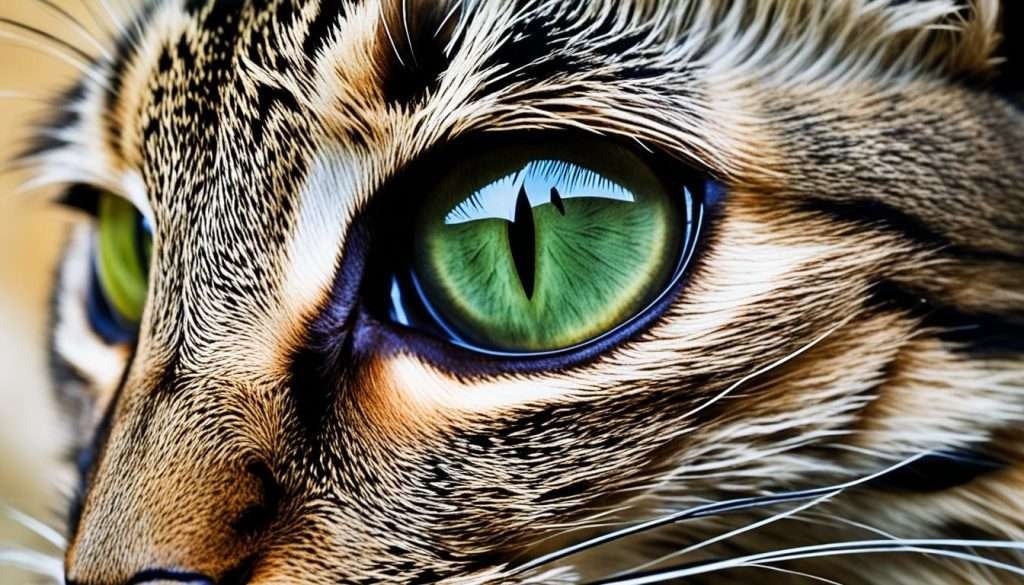
Taurine Supplementation for Cats
When cats don’t get enough taurine from their food, they might need supplements. The AAFCO recommends 0.25g to 0.50g of taurine per 1,000 kcal of energy for cats. Cats eating about 120 to 160 kcal a day need 30mg to 80mg of taurine, depending on their diet.
When is Taurine Supplementation Recommended?
Cats might need taurine supplements if their diet lacks it, like on homemade diets or with certain health issues. Cats can’t make enough taurine on their own, so they must get it from food. Signs of taurine lack can take 5 months to 2 years to show up in cats.
Taurine supplements help with conditions like heart disease or prevent eye problems if caught early. AAFCO says cat food should have at least 0.10% taurine for dry food and 0.20% for canned, for all life stages. Cats needing more taurine might get 500mg a day, as a vet suggests.
It’s best to talk to a vet about if and when to give taurine supplements. You can find taurine supplements for cats in different forms like tablets, liquid, capsules, and powders. These are used to help with DCM, eye problems, epilepsy, and liver disease in cats.
“Taurine is crucial for cats and seeing a vet is key for any taurine intake concerns.”
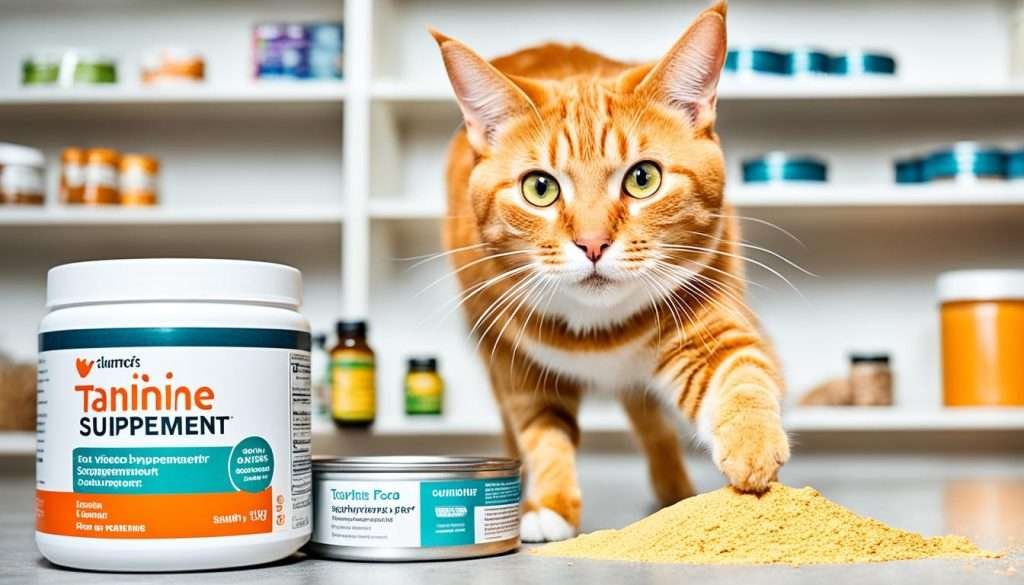
Taurine is in foods like poultry, fish, mussels, and organ meats, and red seaweed. Not enough taurine can cause eye and heart problems, digestive issues, and pregnancy issues in cats. Giving taurine supplements is safe and won’t harm cats.
| Minimum Taurine Requirement | Dry Food | Canned Food |
|---|---|---|
| Adult Cats | 25 mg/100 kcal | 50 mg/100 kcal |
Adult cats need at least 25 mg/100 kcal of taurine for dry food and 50 mg/100 kcal for canned, says The Association of American Feed Control Officials Publication, 2021.
Ensuring Adequate Taurine Intake for Your Cat
It’s important to make sure your cat gets enough taurine for good health. Most cats do well on high-quality cat food with animal proteins. This is because adding taurine to cat food in the 1980s helped prevent a health issue called dilated cardiomyopathy.
Cats on homemade or vegan diets might not get enough taurine and could need supplements. Talking to a vet nutritionist can make sure your cat’s diet has the right amount of taurine and other important nutrients.
Commercial Cat Food and Taurine
Cats need taurine because they are obligate carnivores. You can find taurine in meat, fish, and some dairy. The Association of American Feed Control Officials says cat food should have at least 0.2% taurine. So, cats eating balanced commercial cat food usually get enough taurine.
Some cats might need more taurine if they have health issues. Cats with heart problems might need more taurine too. If your cat needs more taurine, talk to a vet to get the right amount for them.
For homemade diets or adding taurine, get advice from a vet nutritionist. They can make sure your cat’s diet is right and complete.
| Food Source | Taurine Content (mg/100g wet raw) |
|---|---|
| Scallops | 827 |
| Turkey (dark meat) | 306 |
| Chicken heart | 118 |
| Beef | 43 |
By making sure your cat’s diet has enough taurine, you help keep them healthy. This can be done with the right commercial food or with help from a vet nutritionist.
Conclusion
Taurine is a key amino acid for cats’ health and well-being. Cats can’t make taurine on their own, so they need it from food. Not getting enough taurine can cause big health problems like vision issues, heart disease, and reproductive issues. Luckily, most cat foods have enough taurine to keep cats healthy.
Feeding your cat enough taurine keeps their vision, heart, digestion, immune system, and reproductive health in top shape. Talking to a vet can make sure your cat gets the right amount of taurine and fix any shortages. Giving your cat a diet rich in taurine is easy but very important for their health and long life.
In short, taurine is very important for cats. Knowing how taurine helps cats stay healthy and making sure they get enough of it will help them live a long, happy life.
FAQ
What is taurine and why is it important for cats?
What are the consequences of taurine deficiency in cats?
When is taurine supplementation recommended for cats?
How can I ensure my cat is getting adequate taurine in their diet?
Source Links
- Taurine in Cats | VCA Animal Hospitals
- What Does Taurine Do For Cats and Does Your Cat Need It?
- Top 5 Benefits of Taurine to Cats and Dogs | Addiction Pet
- Taurine: An essential nutrient for the cat. A brief review of the biochemistry of its requirement and the clinical consequences of deficiency
- What is taurine and why do cats need it?
- The Importance of Taurine in Cat Food – IAMS™ Malaysia
- Taurine Deficiency in Cats
- Taurine Deficiency in Cats
- Taurine Deficiency Myocardial Failure in Cats: Science or Serendipity?
- Taurine for Cats
- Taurine for Cats
- Why taurine is so important for cats and dogs
- Taurine for Cats: Overview, Dosage & Side Effects – Cats.com
- What is Taurine for Cats: Good Sources of Taurine for My Cats
- The Importance of Taurine in Raw Diets, Essential Amino Acid, Cat Guides
- The Importance of Taurine in Animal Diets – Exotic Pet Wonderland
- Why is taurine important for cats?
- History of Taurine in Cat Food
